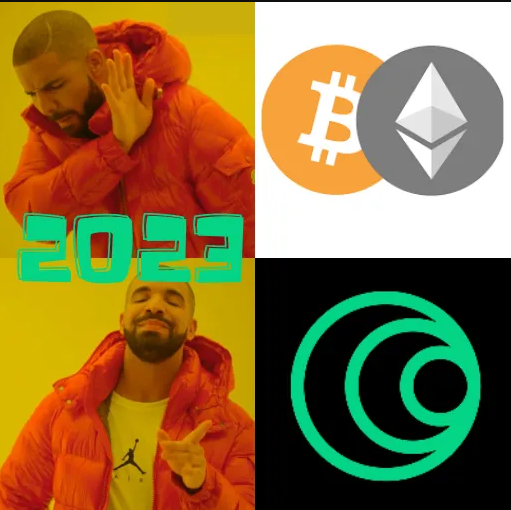Islamic Coin (ISLM) is a Sharia-compliant digital currency, set to be released on September 01, 2023. The creators of the coin have the goal of revolutionising Islamic finance. In this article, we will explain what that means and what the cryptocurrency will be used for, and the hurdles it could be facing. We will also look at the potential of its reach — if it appeals to the estimated 2 billion Muslims in the world, sheer numbers may tip this cryptocurrency into a leading proposition. But will it be accepted by those who it is built to appeal to?
As of July 2023, Islamic Coin has raised US$400m (AU$580.8m) in funding. While this mammoth investment does not guarantee success, it does put it into the category of a cryptocurrency worth watching.
Introduction to Islamic Coin (ISLM)
According to CoinMarketCap, there are around 22,932 cryptocurrencies in the world, however many of these are “dead’ or forgotten about. Just over 8000 cryptocurrencies are active. As a new crypto, Islamic Coin is late to the game and needs a unique selling point. And, it seems to have one.
Islamic coin was developed to cater specifically to the values of practising Muslims. This is potentially a huge market, estimated to be anything from 1.2b to 2b worldwide.
Islamic Coin (ISLM) is a digital currency that adheres to the principles of Sharia law. This makes it the first Sharia-compliant cryptocurrency.
It is set to go on sale on the 1st of September, and the company issuing it, the Haqq Blockchain, will use the US$400m in funding to launch it across the Middle East and North Africa (MENA) region.
Binance also have listed information on their website about the coin.
What does Sharia-compliant mean?
To be Sharia compliant means sticking to principles in Islamic law. But what does that mean in terms of finances?
-Islamic principles prohibit the charging or payment of interest. Rather, it promotes profit-sharing or risk-sharing arrangements.
-Engaging in uncertain transactions is not allowed. Contracts should have clear terms and conditions, and everyone involved should have a good understanding of the potential outcomes.
-Activities that resemble gambling or speculation are not allowed, if gains are based on chance rather than genuine trade.
-Funding of concepts that are forbidden in Islam are also not allowed (alcohol, gambling, pork, and unethical business practices).
-Businesses must be socially responsible and good for the well-being of society and the environment.
-Transactions should be backed by tangible assets.
-Excessive risk-taking is discouraged.
-A percentage of profits must go towards charitable endeavours.
Sharia-compliant finance is an alternative financial system that upholds Islamic values while providing a range of financial services. It is these principles that Islamic Coin hopes to ride upon when it sells its cryptocurrency.
This makes sense in theory. But what about in practice? Recent studies suggest people are loosening their ties to Islam in some parts of the Middle East, especially in countries such as Iran. And, especially if they are young. So is being Shariah-compliant going to be enough to make this coin popular?
Expert opinion
The Australian National University’s expert on Islamic Finance is Dr Anas Iqtait. “I posit that for it to gain traction, it needs to prove its significant utility. Like Bitcoin, the appeal of Islamic Coin won’t necessarily be boosted by their alignment with Islamic law. It’s an added advantage, but not a defining one.”
Dr Iqtait doesn’t question the potential benefits and practicality of the Islamic coin or the founders’ vision. “I acknowledge that the crypto sector, though still in its nascent stage, holds immense potential for growth and consolidation by 2030. It’s vital for the Middle East to take a leading role in harnessing the innovative and economic potential of this burgeoning sector.”
Eli Taranto is a finance industry executive based in the United Arab Emirates. His personal opinion (independent of his professional life) is that he is in support of Islamic Coin. “My personal view is the community is not your typical crypto audience — it has already grown to over 1 million. It went from minimum viable product (MVP) to fully fledged platform pretty quick. It has an interesting team and a much-needed ethics-driven approach. The coin may be a hedge against other cryptos as well.”
What is a Fatwa?
Islamic Coin was recently given a fatwa in approval of its activities, by Sheikh Dr. Nizam Mohammed Saleh Yaquby. He is known as ‘The Gatekeeper’ of trillions of dollars in Islamic financial products.
A fatwa is an “opinion” from an Islamic authority to say that it follows Sharia principles. Islamic Coin now claims that it has gained recognition and is poised to revolutionise Islamic finance.
A positive Fatwa is not legally binding, but it can provide reassurance that it aligns with the principles outlined in the Quran and Islamic teachings. Not every Muslim authority able to issue fatwas agrees, however, with the fatwa of Islamic Coin. Muslim scholars in Indonesia, for example, have not agreed that any cryptocurrency is acceptable.
Islamic Coin hopes to convince practising Muslims that by using the crypto, it can financially empower the Muslim community, while upholding the values of Islam through blockchain technology and innovation. Whether this will be the case or not, remains to be seen.

Big names behind Islamic Coin
The Islamic Coin overlords are an interesting mix. First up is computer science engineer Mohammed Alkaff, the Co-Founder of ISLM.
Another prominent figure involved in the project is Sheikh Dr. Nizam Mohammed Saleh Yaquby, an expert in the US$4.2 trillion Islamic financial market. Hussein Mohammed Al Meeza is an Islamic banker associated with Dubai Islamic Bank. Also on board is Peter Raffety who is a fund manager at the Abu Dhabi Investment Authority. And, there is a princess on board, from Dubai’s ruling family, Her Highness Sheikha Mariam Suhail Obaid Suhail Al Maktoum, among others.
The Haqq Blockchain and proof-of-stake mining
ISLM operates on the Haqq blockchain, which they say is an “ethical Web3”, designed to be autonomous, immutable, and independent. The blockchain is built on the concept of proof-of-stake (PoS) mining, so that Islamic Coin is decentralised. PoS mining makes sure that energy consumption is low, compared to Bitcoin’s proof-of-work method.
According to the ISLM whitepaper, there will be a final total of 100 billion tokens. The initial release (which they call the genesis block of Islamic Coin), has 20 billion tokens. There will be a gradual reduction in new coins being created over time, and production will stop once the total hits 100 billion tokens. This, according to the white paper, will create scarcity, value, and prevent excessive inflation.
Every two years, known as an Era, the emission rate (new coins being created and released) will decrease by 5%, until it stops at 100 billion. It is estimated that this will happen 100 years from the first block of the first Era.
Enthusiasts
Aqib Farid is an entrepreneur, artist and social media presence. He has YouTube channel with nearly 500k followers, where discusses issues related to Islam and with life in general. He is in support of crypto generally and particularly likes the ethos of Islamic Coin.
Farid says that the fatwa for Islamic Coin is not entirely necessary, because generally speaking, most Islamic scholars are okay with crypto as long as it doesn’t involve fraud. He also says that many of the scholars that he follows are waiting for government regulation about crypto before they express an opinion. While he says that he doesn’t consider the fatwa that important, he does support the idea if Islamic Coin.
“I did some research on Islamic coin, and I found out this has been made especially for the Muslim community and has been created on a native Haqq blockchain, and all of our Islamic values and principles are aligned. Another interesting thing about this coin is it also has a Sharia board. The Sharia board includes some of the UAE’s royals and traditional bankers including some from Dubai Islamic Bank.”
Charitable donations
Farid says that another positive attribute of this coin is that whenever this coin is minted, 10% of the value is stored and will be used for charity and for the benefit of the Muslim community. But, he particularly likes its potential.
“If only 3% to 4% of Muslims who trade in cryptocurrencies join the network of Islamic coin, then this coin can reach the potential of Bitcoin and become very popular. If this happens, its value will reach $1 trillion, so $100 billion will be used for community work and charity.”
He says he thinks the Muslim community should go into crypto, and especially Islamic coin. “We should keep on doing research about it so we don’t get behind the rest of the world. We Muslims should understand the crypto world and take advantage of it for our community.”
Edge over Bitcoin
Bitcoin is the most popular cryptocurrency by market cap. Bitcoin is way more widely adopted and can be spent in the real world already. So why would Muslims adopt Islamic Coin when they could just use Bitcoin?
A factor could be that multiple Muslim authorities have branded Bitcoin “haram” (not acceptable). Being Sharia-compliant makes Islamic Coin different to other crypto, so it could give it an edge.

Problems
The volatility and speculative nature of cryptocurrencies may introduce risks for investors, especially if non-Muslims buy the coin and trade it in ways that don’t match the principles that it was created under. This will contradict the principles of Islamic finance, as set out above. While Islamic Coin presents a promising path for those seeking a Sharia-compliant cryptocurrency, there is no guarantee that it will be used as intended.
Islamic Coin’s founders have set wildly ambitious goals for the currency’s adoption. They say that if even just 4% of the one billion Muslim internet users opt in, Islamic Coin could achieve a market value exceeding $1 trillion. This puts it alongside the market cap of the world’s biggest cryptocurrency, Bitcoin. For a new coin, these ambitions sound lofty.
Expert opinion
Dr Iqtait says that his perspective on cryptocurrencies, particularly those claiming to be Sharia-compliant, centres around their potential to appeal to an Islamic audience. “In my view, having a religious endorsement or fatwa might not be sufficient to expand their appeal beyond those already interested in such cryptocurrencies. I express some scepticism about reaching a wider audience not yet invested in cryptocurrencies. Around the world, religious bodies have differing stances on cryptocurrencies, with some considering Bitcoin ‘halal’, or permissible, while many prominent, government-linked religious institutions view them as ‘haram’, or forbidden.”
Dr Iqtait says that an essential debate among Islamic religious scholars is the idea that for any currency to be acknowledged, it must represent a state institution – in other words it must have ‘sovereign backing’. “This is something that cryptocurrencies like Bitcoin and the proposed ‘Islamic coin’ lack. Despite the Islamic coin reportedly being hosted in the blockchain-friendly environment of Dubai, it doesn’t have the required institutional (here read “sovereign”) support. I question whether the Islamic coin could draw more followers beyond those already invested, particularly since the Middle East is among the fastest-growing crypto markets globally, even with strict regulations and Islamic prohibitions in place.”
Dr Iqtait emphasised that the use of cryptocurrencies in the region, as seen in Lebanon, Egypt or Turkey, is not because they are Sharia-compliant, but due to their economic utility. “In countries like Lebanon, where economic crisis persists, cryptocurrencies have served as a way to transfer funds and combat the dollar shortage, spurred by the depreciation of the Lebanese lira. Despite my personal views, it’s worth noting that most Muslim scholars and established religious institutions have banned cryptocurrencies, citing them as speculative assets not tied to sovereign or state institutions.”
Women and Islamic Coin
Dr Nada Ibrahim‘s background is cross-disciplinary including criminology, psychology, with an Islamic Psychology intersect, Islamic studies and education, at the University of South Australia. She says that making sure Sharia compliance happens is a constant process, it is not a stagnant process.
“The Sharia compliancy has to be continuous because you don’t know what will emerge until something’s on the ground. How does it operate when new challenges come along? For example, we didn’t know how AI would impact society. We don’t know everything about AI at the moment, its repercussions or implications, and we won’t until quite some time. It’s the same for Islamic Coin. It’s about what’s going to happen once it gets launched. A whitepaper can be glowing, but until it’s launched, you won’t know.”
In terms of women and ISLM, if the coin follows Shariah principles, then Dr Ibrahim says that women will be in control of their finances in the same way as they are with traditional shariah-compliant finance.
“From the perspective of Islamic jurisprudence, women and men are independent in terms of having their own finances. A woman’s property is supposed to be separate from a man’s property, you don’t have joint property. Even when a woman gets married, her property should remain separate to the man’s. So if Islamic Coin have set out to follow Sharia, it would be against the principles to block women from using it.”
Islamic Coin: Conclusion
Islamic Coin could represent a groundbreaking development in the crypto space. A Sharia-compliant digital currency that matches the requirements of practising Muslims might just get the cut-through needed to be the next big crypto.
However, not all Muslims agree with its principles, and not all Muslim authorities agree with the fatwa. These sentiments could affect its uptake. Also, the coin will need to compete with well-established Islamic financial systems and institutions that already adhere to Sharia principles.
ISLM Co-Founder Mohammed Alkaff said in a statement, “We are proud to build and deliver a Sharia-compliant, immutable, independent financial system that serves the Muslim community and beyond. A pillar of stability, intertwined with values that are future-proof in a changing world.”
By Q4 2023, the project says it will have integrated 20 payment firms in the Middle East and North Africa (MENA) region.
Will Islamic Coin usurp Bitcoin as the biggest crypto? Or will anonymity be the end result, just like a bucket tonne of other crypto hopefuls?





